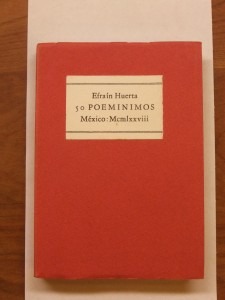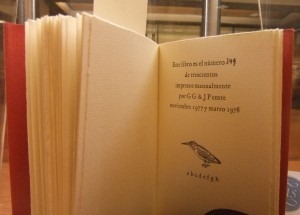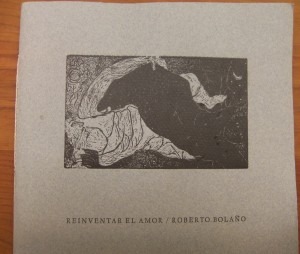31. POETITOS
el que
esté libre
de influencias
que tire
la primera
metáfora
31. POETITOS
he who
is free
of influences
let him throw
the first
metaphor
I don’t know how I first heard about the Taller Martín Pescador. It may have been while reading the Primeros Libros blog, which has a brilliant video about the printer, Juan Pascoe and about the press where he prints his remarkable books.
Or it may have been from Carmen Boullosa’s 2007 obituary of Roberto Bolaño in The Nation. Boullosa describes the literary scene in Mexico City in the 1970s as a battleground divided into two camps: the Octavians, aesthetes who followed Octavio Paz, and the Efrainites, street poets who followed Efraín Huerta. Bolaño was the leader of the infrarrealists, a radical subgroup of Efrainites memorialized in Los detectives salvajes under the label “visceral realism.”
The Efrainites, Bolaño, Boullosa, and Huerta among them, printed their chapbooks at the Taller Martín Pescador. “Exquisite limited editions,” Boullosa writes, “chapbooks printed on dampened paper using movable type and a hand press.”

The Harry Ransom Center holds four books printed by Juan Pascoe. Like most of the HRC’s holdings, these books can be viewed by anyone with a driver’s license (not just students) willing to watch a 15-minute informational video about archival safety. This is different, of course, from the archives that Arturo Belano and Ulysses Lima visit in Los detectives salvajes, where they are turned away at the door.
The books are, as Boullosa writes, exquisite. Efraín Huerta was known for his «poeminimos,» or very short poems, like the one printed above; 50 Poeminimos, printed in 1977 in a petite edition with a deep red cover on thick, cream-colored paper, is a powerful vessel for these miniature poems.

The HRC also holds a rare, hand-pressed copy of Bolaño’s first book, also printed at Taller Martín Pescador. The chapbook cover features a print of intertwined women’s bodies by the visual artist Carla Rippey. An archival artifact, the pages of this book are uncut; only half the poems can be read, the others are sandwiched between sealed paper.

There is something overly symbolic about tracking down the archival traces of Bolaño’s poetry: sitting quietly in the Ransom Center, the whole enterprise begins to feel not quite savage enough. Like we should be drunk, we should be conducting a drug deal, we should be fleeing for our lives. Like the stakes should be higher and the poetry should be so much more present.
And yet let’s not deny the visceral power (pun intended) of holding these books in our hands, even in an archive, even while sober and legal and steadily employed. This post is the first of what may be a summer of archival blog post as I travel through Mexico, tracking down some mysterious books of my own. On the eve of my departure, I leave you with this poeminimo from Efraín Huerta:
18 OPTIMISMO
Si tengo
Suerte
Llegaré
En un
Poeminitaxi
18. OPTIMISM
If I’m
Lucky
I will arrive
In a
Poeminitaxi
